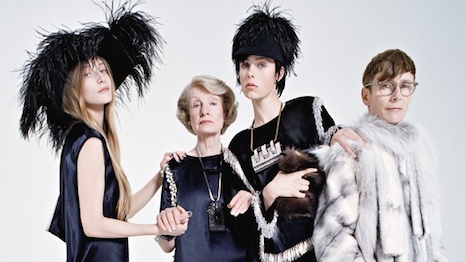More than 14,000 ultra-high-net-worth individuals are expected to transfer a combined $3.9 trillion in assets over the next decade, according to new research from Wealth-X.
With 66 percent of these ultra-affluent self-made, this may be the first time that a family’s wealth is being transferred. Wealth-X’s “Preparing for Tomorrow: A report on Family Wealth Transfer, ” sponsored by NFP, discusses trends in wealth transfer and best practices for ensuring that a family’s wealth is successfully passed down to the next generations.
"As UHNWIs age, they tend to reduce their holdings in public companies, and increase their holdings in cash," said David Barks, associate director of custom research at Wealth-X. "The dual importance of cash and private holdings, and the paring down of other assets, may suggest older UHNWIs are trying to have it both ways – wanting to hold cash to give flexibility, but remaining heavily invested in their primary business, of which they are reluctant to give up control.
"They also think about who will be inheriting their wealth and what effect the passing on of different assets to different inheritors will have," he said. "As primary businesses make up a very large proportion of these individuals wealth, the ownership and control of significant businesses across the world and especially in North America may look very different in the next 10 years.
Planning ahead
The report focuses on UHNW individuals, or those with $30 million or more, who are 80 years and older. While this population is older than the average age of 60 among the ultra-affluent, they have an average net worth of $272 million, higher than the overall average of $141 million.
Wealth-X postulates that even though these individuals may not be running their own companies anymore, their wealth has continued to increase due to the efficacy of their financial planning. Because of the benefit of years, their wealth is on average seven times greater than that of the under 30 crowd.
Most of the UHNW population over 80 lives in the Americas, with the United States expected to have the most wealth transfers out of any nation in the next 10 years.

Image courtesy of Ralph Lauren
While male ultra-affluents are more likely to be passing wealth onto their wives, women are often widowed and looking ahead toward passing down assets to their children. Their viewpoints and considerations are therefore different.
Those looking toward a wealth transfer typically have 34 percent of their assets liquid, compared to 21 percent for all UHNW individuals. With their higher net worth overall, the over 80 population generally has $92 million in cash, more than triple the $30 million average.
Increased liquidity promotes flexibility when it comes time for the wealth transfer, allowing for diversification of assets. This also helps to make up for illiquid assets, which are often held in other countries.
Even with this focus on liquidity, private holdings are the greatest asset to be passed down, with those planning a wealth transfer keeping 36 percent, or $100 million on average, in the family business. Those who have inherited a business or are the founder have to make decisions such as whether to keep it privately held or go public, what role family members should play and the division of what is an illiquid asset among multiple parties.
For instance, Giorgio Armani, the sole shareholder in his namesake fashion empire, began to think of the future of his company by establishing a foundation to keep the house autonomous (see story).
Avoiding making these choices can mean that the business suffers, as it is put into the wrong hands, whether they are incompetent or uninterested.

Thomas Pink fall/winter 2016 campaign
Real estate offers similar challenges to a business, since it is illiquid and cannot be divided easily. For those who have invested outside of their home country, domestic and foreign policies can also impact the transfer of the asset.
Also in line with the family business, properties have emotional attachments, making either the original investor or subsequent inheritors less happy to sell.
Those in Asia-Pacific have the greatest share of their wealth in real estate and other luxury assets. These individuals keep 12 percent of their net worth in these assets, compared to 5 percent in other regions.
When possible, UHNW look for properties in areas that will not be subject to what they consider unfair taxes (see story).
"Real-estate and luxury assets may not be the asset class that makes up the largest share of the portfolios of UHNWIs who are transferring their wealth in the next 10 years, but it remains significant, with average holdings of $16 million," Mr. Barks said. "Much like private businesses, the complexity of transferring property to the next generation comes from the illiquidity and indivisibility of this asset class, as well as the associated potential tax liabilities.
"For this reason, the role of advisors, be they independent financial advisors, family officers or lawyers, is crucial in helping families, and, as with other aspects of wealth transfer, in avoiding any surprises," he said. "This is especially true for international properties, where both the local and foreign laws can impact investments, and the full implications of this are not always considered."
Guarding the future
Not planning ahead could mean that the UHNW individuals themselves or their heirs have no say in the transfer. Financial advisors can play a role in facilitating the conversation.
"The first step [for financial advisors] is really understanding what the wealth holders want to accomplish, understanding their values, ideals, and ultimate goals with respect to their wealth and their hopes for their heirs," said Kris Stegall, vice president of strategic resources at NFP.
"From there working to start a dialogue between the wealth holders and their heirs to discuss the short and long-term goals of the family, what’s important to everyone, and how family assets should be managed going forward," he said. "It’s at the point when the family is on the same page that true wealth transfer planning can begin and situationally appropriate techniques, such as recapitalizations of businesses, gift planning, freezes, estate equalizations, implementation of trusts, life insurance, and so on can be discussed to their full potential.
"The hope is that assets are passed down in a meaningful, thoughtful and efficient way so as to avoid family fighting, fire sales and loss of wealth."
Wealth transfer plans often include strategic moves to guard against political and economic turmoil.
Russians have seen their wealth decrease as a result of sanctions and a drop in oil prices, causing many UHNW individuals from the country to invest overseas or change their citizenship.
Similarly, the uncertainty following the United Kingdom’s vote to leave the European Union could have an impact on how wealth is or is not preserved.
The Panama Papers opened the lid on thousands of offshore accounts, but despite the scrutiny of the leaked documents, this is a largely legal way to guard against instability at home.
A key concern of the UHNW population is for their safety and privacy as regulations push for more transparency and disclosure.
Despite stock market volatility, geopolitical instability and new regulations, prime residential real estate still has a good outlook, according to panelists speaking at a presentation of Douglas Elliman and Knight Frank’s The Wealth Report 2016.
Oil prices have plummeted, governments and the IMF are tracking the flow and origin of incoming money and many assets have had negligible appreciation in the past year. Nevertheless, a look at recent history and wealth projections show that a bet on long-term growth and on real estate, as well as classic cars, is a safe one (see story).
"Once a wealth plan is created and maintained, and all family members are educated and prepared to ease the transition, there are also numerous external challenges to overcome," Mr. Barks said.
"One of the best ways to anticipate economic and political instability is through diversification, ensuring a UHNW individual is never openly exposed to a single country, currency, asset or industry," he said. "In light of these global volatilities, UHNW individuals may seek locations with greater stability – the U.S. is favored for its strong and stable currency and property markets in major cities such as New York and San Francisco.
"This diversification will however lead to increased complexity when transferring wealth to the next generation. Tax liabilities can accrue for international holdings and there are multiple laws to navigate before successfully transferring wealth.
"The need for expert advisors who can collaborate with UHNW individuals to manage these hurdles is growing and will continue."
{"ct":"4EyBt61A3h9sUEfu2l7FJAMIp0ATZpmfH2zlDFIg5SWyaQbDOB1Oj6YydLwF7h4R2MqxIr2RWYG+DMu1LCRWfN1KD6pG0nEvXVaGZzLnXJJdlmFanNh2Vgdw6nZJBvjTwGKtASo4YjntQwpj3uyl9lTSVyFhG6Us4DRNemPlKFO6jxR8kbskuXK83a987pP7oakfDkyFrtZejL4MSB\/BsgSnbrSg2Zwxq+wF\/ar3ohAF9WXVpAuM4hfdZIG3xRWkR0m9JsnCdFhtdVwAYb2C967emWOYX6CVnZ6nzQPCLyTPesGrK2ng8Xz6uVhxD1\/Jl7bAbDd\/GJZ2DfwgPYyOHwTcB\/uqNl1XeMcdsdlVF8d8QFjdTCDtpwn+QLiTqrCkEjUj7SSCu72\/xCwBcpwZGIJB\/WTQF0tTtm6MAcxEk8F12ja2VaxFPCeuJtTpA63wfflIB\/80l8dMvBcBPr0BrGyYwJakuLwpzAQ2578F0pQa63GjqKlIbfadu84sFobYoP1DLt7BP6yoknV9QiMBCwFndBQryK9fk\/Cl7c3xvoN9sa1ntPHHWvNSzz0sAWlYb5hdR4WnJhebxW15bi2YBPNNv1udd4kxB5RqTjo4XXe78BZWZXaCCeQgzkvOqjYKhAtpCw6J0lCybcuclr8DJWZEvpmyfLERKzneZwd4YFEeZKDinqhRzuJsThKPSyUubaXZHxHSf2p1Fc9lgkqkl2PfCpv0\/1RHVqe5\/o2GpzyLH7wdRe7UuAoGKWZT19TajzylRH5FZvzSe2zeTwfrm\/mrcQHbdr7Xq4ubBc+zG+7QhM6wM8UYF7gQ5C7gxwPhhTgGc01RQzltOe0BKLlnbz0H6aiHuySxWn0qVa44ZorhzTMCfbyHNEs9toMdC+9k3lQqAXDGrp6JSzULojA3N\/JieiExY+LRWrbIBFtnkLKPxBdVGVN7P+OrhU3DByu6z5Uq886iD9WJTKiRqWY1wVzpI0t\/Cn8zi8rhWoEKJVU7gs2GdC+KlzEmaZfETwY3JbiYFvF2AdsfkhjIw5Azr+lCUDwd7c8\/qNNk\/MxsjCEcLPs63Lkw3YZkFQjfhz7TYGrXsjJVBnNOKPKBHhXrLi1DEbuSOETIHMKMA1XXB40g33C\/eeI94WMlXfvGrV0djnAFM04HODTyDOulDqK79ndYO4L+xg4uSLP9FbjhCJAw+ZCrYyjqdZsHCsb79F+xKR5VEoHGe7L9sJsJKmaluVZiZlOAPmCcm4b0gSEGueVtVkE5ongZAjC1UZRSkyy00BAdN1AGxeGsIp5TuyvNl306B5KCubiwX8REwXH0AvFIkk4ZowzsvxpJE9CCCEeibw2FJZY7FewuN1Emn1Bn6A33VB9MsFgtmSYGmG1z67sobyI9TbnO+8P431Jbm8MYqF001f\/IPXCiyxw9aMPswZO1drfDZnpGMZ\/i6Ok9UTCzDBBnDSPgBZgXm3MuyVSzbWe5ZRCXuYj5TQF8S+6VkWWXNXCa20iot02wJsbxj7PEHV7BAGVYNN3qybIJF0fLmM1By2U4pUlPHhbw3RfyQfHVEMXXWcUu7VW5LGtAWK5FOxJQsJCcOIDfVuF0N3n7KQFDyzaNZKyQjtrlI\/2jwa4iqB12C\/dzevUNTmcxuTJrGZRhnKw63RgLAD9mGGTROQMxohr3ABdwAps1PQwgKBlreIjsyb+SHnERs8rQmrbQsnDTmYvSpdwmm9Zlzgjf9XSUxE79+VzwaNXh5W4C76F\/ul71jLqDSgucq0obN28iqdmirwxD2oQvV5s6gEobjDjB7LuSgqyKPduYDtA13JDh9+NerzoW1flIAsEH1HheJ7YDjBNdWiqEwftXiOfBJAdTQFXOfP3WOlmsF3jh3oZmkkGcQqaWZcdfJARjN\/5jDLss+ikCheIy0HduLp4EintUY7gionmOxHVYKyhUDc7zQ5xanIIN217X0+BWlo9L0ROpCmWaEv6MhPigoHjlrmboUFfeqj4+fZVju\/Ep27h6uK8zv9BoSvJDM5oaloDeLtiEkyPgt99\/xRzy+ZPEWgVT+cXdUr5M8ZQjXLbFRySuND+ztwWC2jcgbB+VGxw2e6sXMj0CZ\/hUUzho+BqGnj5mtaQvYxnYnyXqSyPiqtmb5DZmRDf3xdz3K7InLfiRGYCfAhqa5lb0e1qwHFEFGS9f9j+j7T5g1cQf\/bhvPzjVuflFYjd\/telH+Vgy\/D7V56WYaBw4m6CBufoQSKQv7tkRq\/cwN0C0BNFK1zFGsqnB5lXdV9M2crd5tW+Um03C\/9AzrKyPrEhVSejQTMX5I7NtuhYv7Oao+3krN4eDUbvzxlH+WIz3qmDRLxaSWE2KiyukWB3EUzvixSHEu0\/sGaYV+u9HICqdqC22mOiptrI8t\/riz1UcHOiMD9R3jN1DCI4PQ8daZwqQJnp6rw1ApX3jE9vBZKkILgvyQlHd6OV5ljvq+jlJAiBpIdreAMcepPhpM4hF\/iPZh+i9kE5DNwQLbr4Bh7L9obvSxU5YEfd7k9z0RfveJ3Q3WTWDM8y7KkvrVF5DCaDlnqYrmAmSwsw4m7ufTjEzGruuDKHK+CSXZZ+9Lv4APhSFgU75G36WLjAGYNE3HBpvXDe5XvEIm3d9VGLGXciXnRAxY9SlwxV8iBL17tdHFO55ts6FVuPCXRDBJaOPzgjj7ZrFOJbNM0PkSiRgEzONbNLsi8kofh+CXZUNWhXwjwtyALgpdcTPj2LBmEKDd94H8LMhiecwsL7udXKPGpHD4YSksR5Kewu8fUTunhSAHMWFXChLSZ3UxcdgDS3EH\/+Iu9AS1VH4oRfoW0d6DbRAx+EBDoyQfTWCdZHu63Iv20cMeDJwz8OoUdl1a90k\/SBo66Adp3Ve48Y+x6inKVCUrm6FW0slDOS8aZjZkVEf8LOUMiVvZ5QNkgfQUVTq9W81Jsy7nt2rGE\/rJLYfD+J6Qb7pIliKDCa1YlYKVD+feOqvV\/TzoW+veYOE2Vt4px1pBiJG8qzRPuKOF7tvsbRGTiaDZ17\/SJJ85JP6Ajoq0snxBcl+vTQlPRjT++DVfUQY\/PS8nqKv8ZHLKJdJLZVl2OjfELH2Mlw+PUj7+hDx4c6PDX6fdwRfy8Z2+BSAW\/QDr0UDsr08vzIQbYhNatsTshNGjeWtRGx8aMEl2p7Pdx4IEwdq50jGbxIhc2obfxtFE7BuIf+BCFDVVBxoy6DjkSCqR4bZcUzplSxmSoW4HGQ8h6MkUnLyOPIpXVq1QgUTpec5HOSnWOLSYLTao2OH9iGEuVGb70c2RaQQi7+2EtEXOLyD9pj3C8xFszwbyVmA0GfUpKBbIe0vxqzY87\/+xFxQCF7VRVZDyi2YvAtYNePKUfDuvybgnZ1NoSgEYcOMLqv14yIoI6dnjbwU6qTYH0xH0kMMGD0AXWR+STXpbpNReq9n8+bMYQYELP5nyzh4txil3PYn5KKRFxZ3G\/8YW03PTYcQhixHAZUbsxZdAbi5dOMenYd66NCMRDn25DlhLqX5JvCX5e8bjQSZmEioDKEIQNyKIr6X+HH3EWoKN8yVE2zK2G8Zp3ssv8SZWI\/Gm3\/PQ6jszGoe44y2PWCp9qVuE\/K5P6HUVONRo0CsVBtlhfmRhLFr9+S0sGrpCBjkvjmTd1jVeaWF5h+j96A90Tv0jniVNQsv5TGtfEh4ATYeT6P7Hnjqm994jqOOAh7oUbvK2aJhWAWf07quHtwcXnPhKtOGBr3bDxott3Cfu7XSHdV45ixtPvJ10SuEHatelkVJpTjEw7FC2K9dFmMInQ3JKoqB2Gdn1Vmh8TZ1eIBUIuKhouwMZX+Gy79LZ0kqv7N6p5VnytaD6GIf5PsXwHHRB2NyWw9P4SDxnwu+AXjpIJi5w5bIZdSN+ILkZH7krhq7\/QrHKQWEA43LR4qz1uaTc6IGgSVjborxkH4G6qAzDSzbJQYpFMoxIIiFE8UiQd5LA6gsh1YXR4oDWCZRI9cwYflsSWQELlk1ODpovRCuTRX5MqiUBNB9L8\/5vHpFKGuzWOGS79DpQI56CvQLqC0oVjiVojI6kRzSaWsMR6VRRr+4K32iEDsQvbaKe7NFBeRsk4ikr8fURXUrAa0HIHLFjeTlIzzqy1FjNrK1V+FNI04lyk6yfcIr2CtI3cALkpzwDNcHW1FaIKCUg1zmyB6dGARamtRO46ZAhF6WkYHwBqCvas\/wSJjSLdUsoXMWD8deHwgMyAgJGjLdPhjtpR4pSPGfIiKFHAts1eLEmFCKoBOR19HBK3f\/eQmsQw\/d8rUAvl4AiFTIQBqkVet8lRMYM8Ot\/sOY0FH0tFxhR6xUuFIFwEmm9Zq9fKGNOjcMYN3g83tbotnzq2bRqkpOpqf6QJbVNogk5pk\/5Js+FiYgQ5NdegzchNyGTfBz1bzRtD4gnKr1g\/TanifZSSv7XMGVQ6Tdt6JVwYkVUWw3CtdRublb+dJoWM99eFfFffnVGlpdy\/UY2MDuy7bnbFpn6RVEWqFAAkwQXsCNAGR\/1eeDqmobCgtfB5\/iXIEnuePQazSAiLE9NK7FH3BGm\/8bGaujy5qZyi3x2+NaohGqRoNgqBD1EH4gjpwkXgb5WiX+X5+weK4\/EVtb2NStruwbHyJiPajp9GvNtQJbHbz3GAf2g3QaNvTFBuwy5RknRPXdMgQCJqieUmkZetTdlUvuLa5WqrwFco\/Fc\/m5Vab+hIW9tXIcR0SeWognP4JABZQCWYMmgG2HD9KIs3f5O4tEYbSWHxdil0nKmDI90rj7Kgd\/Nd+ycB1Y1imxY+QveWTW59aeK6mMOl7Q9gkbRuT8FHJpzkFi0KoPnHOCe+SlSC5ttnIGvUwWHJj2HhLDoRrz8L6yvFZ7NH5\/ZSlxdq7IsAMlZIj443jKCI9B21NW6ko6hxOOBqjW8nf9Jjs3M4yDRBzHDlxAVbfGW4LJXYTI9jVkGeo9PODX6uVCZvHP5GNJOuTTyIAlTGbZrawVC1tH1\/maeH4WCKkKSpTBkorI1Cw\/UlUh3oIsruF9legygNfRR4VsOZIrn2cjkIQDzbbszdEWAIPi4gCBJnF3WMLJdUH4Ci3oE2PcjV5EyVh7GwQCCVPUc1hDcwL\/iBJmnpFGpgIXcES6E7KEBTVBRRitASl301K\/2G5DSNmq0+MRomqktCBp7yK2rZCSBXF6S0B3ZuaBiPDXfj+gccX13seHbivflzh+7\/Jv2Khyb9QJ7cabaFVd9xYnQLgwU+dGltDnqd+Qjq+cvAfPTy3Nq7ehZTGe87YFvA5EvSAOID1qcOUtTQiQtImx1z0OdNQ2unLMHk6Ui1aPQDLAIm20vh5BURRx\/Xqrrhp8dgbD0MZeECfDEhs9Ls95FgKqLc\/BNpBm5BKEjEVlPPJQtLwuUbFTulGq99NAGysJRwsg60V5G7SM6ynwwUMfSht5oZUV0pKtg\/v9+7xukbhc\/vJHC0ZNgq4b\/qZqwRvt7sftODHQ8RBeC+bHkQbtCdJ5LzH\/sSUjxIJtMCo9bWPwETuDy+1sb2yoIXjAhJe5LvJl2UG277HwCfwdvhYpfmjYy2t8D6nlOetdKP7s2cb22Q7r49hGMdTx4F8sRhXsNlJGiO54f3rpZJv56w8sBjG6nsWpJAm7E5HKV\/li45Ku7pMrM4EDOloN5IByQGUa\/rMGasUbvqhe5+5kIo6H4SzQSQT4trZVL6Wx7c9R5RklgLVuEOAEgdT\/TgRbgFI322RfxzvRV5vBMpguychRJmTAF6sCkz9xGPAV90e5x5cZfwq43nzk8hIsmql8rhDIbeCyXoOthSO17WL7y54KNDDI7EWDOpCojr\/0aHkEalDAbTO2RUWq+K5wEXQOdTJZ9RvqkCEDpzI1AsFf3dwZJhloLnZqmyfH74jZOzdQ60zu6jJDiSW33S9nrY4jCBLw2GpNt5z0aBL+DDVy8hqrg8D9gz2C0ttc9m7f4HGQ8\/N0h9cidI5WmULm6CHxpKXpkFDJRJHWNxYOvQjfov4HugS2xYIVs4X+Pove26uJ9ETWFNa7TRfFgN+sKNKDC3PvzxOLpWGE4cgkJbNvivu2zbBksWHfeNdBKPiHYGVdp2YvovuCaaFPWqmFX4CGh9rWSkdWZeta1QFgdU8F1PtFspTSDTrk\/bqQSS5LwFLZeCYMvKzuOc\/McdEkryE5fYulG+c6QIBH\/rho51oni3p+JzXRdeAiTZzrspv7rBcfbYtI1Osw1CRP+kisTljYOjDBWRqeTiLc8vs420E5xjLv1olYlUWEoHBVGpZ2+9u+uwgvG+nkhoeEe0Z6YSSfGBSSYrPsBegVqQDV5VBd2cLx74I7l7EzaQQ4WWnonqRzCtt2cpJJmxFxcWEk6J8zrEN9VU2M20FqnW40bAAB+SpHljdZCL6X5vHj18V68uXjTlvNLXIm7hg\/3GAO5RWKbYPzpOAFp2RkZOMDWAS6pEPkzP7x+eJByr8OGzlflTYCsxm3dEUcVm+LvZqzk7gewJii6PxlVIp\/YEBlOlxKut7ZR0rQqQ+wZUcj5S6DDe71HHaYVVH9OF1eHTZuCiPB0VzOssj0eLJdL4FRMiuJzwHt9HPNhs1FiUNM2DD2eMm890xcOb46HPiJo9k37oVuBZsfkC8mfz\/o3N2xE1bfxWKCBy2YythBKLEKwGXNG3QkWEbe4N\/37cfPm0vpqrNJwesR1LKP5tHhiHh1UDGyBtSaga5m31yAclkh3fPuVTtSfSn4xDiz3MQG6N\/cScbVOpW\/GQtX5WI3aiW1P\/ZotPCDO9WpUZxocmiJ9PYLAsIg3fAEfRbx5VbNga425iJ9VRvKiwvVx9337PDnZeQNLkK9pflqL3Rft71949YLJ6LuloDHSq1ONcolvoi8RXu36f8GW9wp5rZmBq6oI+NYkVq+i6NKlUVU9Ey1eBoY7tdG7BOJqp9P2hJP7SN0qbes8ePX6z4hVTurBQeF6bkS+tJHp+4BjUd15A\/iyXliFaFJkicyjb\/wSCFhCThrTiuYwiNH\/cY26PWpIBIHXRoVyOXXZrXeRlM17HEhph+7H4UsMZI+aRMIQPoSj4yoY6kyIT2SvH0dmFliQAf3Q\/My954XTXlecLWhwEVWi40UC8oHAqyNuY8tpcBSN6S3h\/JAn9k6aMyj3M8gDGV1F+1gHe0nDJDaAtv8yNVS62DBUEOAN0JDF8xmS5+3GGj+yleKu4pyCmt27rcc3lopA6zh95zQZReHGF1paopGJAIzpub88LHMd8M+owDUP2DUdl3xgR9JWllEqcp9x7LWuL7GzOdZQmd2ImZuUKVrDyPEFLBEaKaizYpaqTm46s+\/bNu2ezjZVCLHKPrYGV70oItIMk79\/hoTt8aP4+z3pWi\/WxVSkPe9O0lT3TzvhzHv3ZzfMdmP4zq6Zieo3GYyTiFIYnLbwQpl\/Fpsfwt+ac1VFz\/Vxnq+G39U2nRbNC\/TU595HSmVNyaZA20bUdXOj\/oF1w5WB+RWgH+uQDk9l8gN7ovupNFZmHkDkgfa5TokOhhUf2BVcxjVTvrdZiHnUzdF2dp9HLHyh2P6yfB53TZfgy5dA98oLrOqDdVmkQnKu1K1\/WnCvrO+DAQr+I87rX04sNMNBsTzWTOTSzXoNI4VyYVN+t0oVFblZTwTBq0KgddmRX7cn7+UfLoC2iY57h3zLz59bZAyuOD17Lo8BCV29Nmq3mlgPki2YzkLRXz4cHPQTLdL5A8tduQZ90w7UNKI2ZwlqSLTgEOc3uGB1DuLRnaCcoxtFEwrUHzX6RlcNcYYolD5S76sB4+W4W74DA3SHjjJrZcB4syjsJ8AuupYIqbqpTqMHmem9HE1VBZYv5FZnCoLLPX1lBWC27jc9YPFFsCJhH4NZW55G2WSbYqjQwH1nE9TfB7Ywq6O1DgRWynuuhC3jRfTytJ8RCF\/Xk2CrolDbfL3papidFIlMkXhAc4GbNKl8jz5bRs5nYiCLr1\/rhH\/7L5a50k7f0qdYGqNy3jVgxC0hYMSy7b4qSrImBrAZNskEM6C9UgSme8iwWdLt38NZnPjqafr\/ZBfMZh2xC3N2snNfTp4N85zHAhlMVyaix+KDDb9IQQmj6ptn5tWkLLnSKlk7J30e1THiPOjFPKIpvBcDZ3wijDqaeg9TQAlJ+r\/TcaeR1cGOnzDdyaaxwWrnNZv+1G\/UmguxGIJTarEB8HRuZnguBRszpnxbFXf67qBAcEQ63Q32OAXB7eHxMdh9qly4q9WDvXzJ+gaBMc4w06XCcf3mnPAZ0V0Dj744N858LpMYRebLvDi7AOawLXuxRWbkt4YfTAZa5ap03YZRxfTGCJz6Etv\/RwhJXQ1S2cz8ydnEnXoOq\/l22OnNqqTEC3wJJEBAcbOCle7xUP20Y5K9lYzEeMrAtWUBclvYsq7mbDzrRenys16Wk9cmu4xJE4G9IeYNfyEhZIjvlcG4mPv6huK\/r0nc97f969BKqZImxYv9bteEZxyRMSi7fpmtlgTDSn0eUzY176LcVueeJtTtVX7KGXqmbTn\/ThJyxl2H4ntZjFvCIsXK\/yBaDr6iMDlt4QVT10uFNsumUt6TSJLy5IlDkon2elIn+LtgnWjTKBp5wi1vtWry5HxT3IN7bBq+Zxx3DrYLHmVPMRdNxGKf6u8QBywGEDSPEMa3R1qI2P3eIeyYpTTj4L+2VChea5rntIilcSSQNaZ4QpP3D7Q2iRUh20XlffOFyLSasmbAY4zl6+3oTZNPvNUMF7OxYZtdUQYKhgLaLYx4StMK4DudYZzpsZvrgRa6VRhwMA9rFhHUA1dbE3pTorHCzQo4sH\/pr6bVmPp7eeM7mCz\/dB2+dqb5WFlP4yh52lAG+NE0lR3DiAnDfUQpK16JHvlgdfxzihIMd3wa+xxwdceUgvMHhJkIEi0N\/PCdk9g+XHzsiZ5wSx9L1v2fG1itB3PBCMd5f\/rUh4KjpxR1yWhv8tNjR0IcmMRoRe24lGTHJbs3cN0NIBS6+1gf4TcP07EVkYmP96K+tfjthh6aa3m2m4p\/JZC3jT2beoEtpSIAfX4UZ80P3Ue2ZwlH2yr9DHk58kVjViT2YZtL5Ufa2h\/O5WDnFJ4Dc2jip5XAUkompuflSRnT0d7\/qfkAPNMVKnKMOY7s1EEy9qnbB0dayy0rq0kSOLe6BX6zdNW1zxEHSoxLppiAui+pdySJAYvX0zPPS9lrgolDnnP5J+5lqQE8f0Ycdb8cqICyULVN+QCP4D12PSs3Tll2umWrjmN8qFd8OYKFUa0Z\/JLDvvTr022I1WWRJrGFChMd3eV+AayRCE3WrbkzYsn\/EgL3pkXC\/wuQmfuzSdtCt9bAxJCwn4Ac7ZPw+woEqnk330VyztHXA0\/mb1ACPM4Ynbp1YQL67uUZP3UqYTQG170ZEuTstpGiz1iEkqZUe9TDH860dFCCodvrWwWynsAyvMAxU60\/yC5k3RT9RnCx+JCcY4+lGBTIhvOA5yIyaP0L1ecgINip15E4Ioz9v4VgU2+mYlmAcHspSJdx8Bfo4ZWj\/fFHTPanoSzrzAB5nxsnpROJQAJORWVa+TwIggsig0OzHAnw9eUBlqi8p5\/ltH0\/KhGFagFucfn1DeUwUjDGr3s5PSZ2ud\/adrhE2dXkpubEnHJG87J3uyHVKulca\/mZZH4fr1UrrNsbCephLDeYu+6I3nY7BBMqiOioMy6X39qdt4uSzFbDCQsbFYDwuMIx7zgXJL0SNLr9z5AMBQrAdS1AeVRQsTLLWY6NU4fx4thXQdvS7+8sNJEDDeVee8L+n1usPfLsa7RVZAozddsMDS01BfUT9PJHqJ4CS3eb9XJj0JrVmhzlAA6KgTz7nOXl+iKv2B4RNSI+McYutKFUJMQfSWVzwfyWEhg0AlbDlB\/LnNK+5Eet6Fc0u2+ZlrMLhgHJZtY7z4KoMOY13uNkpMPOCrogSYLI2PD0abVGWZGMZS7rOqqFjGMFDStFOzrjObLB8I1mLXyftadRbOc\/h0rtSq6we0L7PjwTqJmauNd7N3+SR4zF0AKd5TKEjJ6ZxzowH\/4nd+qa669RiFxqr4lVp+JSVZ3zoHayyGYWBVIppfEKCXbgQBfgEG9czrMfEYW1uks4vhcV57RWlcqmJEscCz2e9c8caCTdadulrOhqWmyrcwBaDgK+\/z2cRzz5RtsLLUo+ZQPWuKgLKxrPZcfqbFam\/rBe7Y9W4IdOKIoAiaSrtTKEnIog6YSjiTX89BEk8KuLZollMsDiH8FQJmg6Z0FAXwM0eTSkHM1crd4CG6ST+Za\/oRa9AGMb\/NWapmssqrM9BbB5K3SUVW7Fyjix93won4mg1TC7jvXCOWEzWOIzlkFvfbRNHbWNDDejdEpplHvSVgeMHtE\/lBBwW22klPeOVAPX34tjPYIyobtumxZnLC+B6Hi\/\/FsY3jUmJ8aYmbFeLIYOm6\/shgotdU+HnWIOCmEdIH82wLNkgQa8agWvDQYW\/zy9j9Joa\/bawbBiPmd1lM2WwE+XcyDDOmnz\/K1\/NR\/2khjlz3TNKI9irILLs2eNXguaWoRKngLWb3TaHWH6oGVo\/P71EWEQgjzdHBcO8MNYK5B+SnvArB\/MyAARhPsdzhPHAGVIvMG5Lia3GFA5LVkZCqSOlIYXS6amuQQ+GGnd0TDBAlbUDQmJZHpKAp7mue\/dK1JM4i37a1e6n2WPMD1gqSPSGMPksLYntA\/sZTU7MXG+N2LPtW\/c+McOsddUUe4OYlzfQPTMzg\/SALutYtCQ0OaUi6E1jDUb9Q0Iwuah60Fp9+oWK88Pz4qb+7OlIsxuaAU38iRaPvIMKdPGICB86lzhui0LaWA9eZEY3Sn0yE3Bp1TLC5OOSvzK1gsQbpAY2+gvK3jicVkstXkEidvw5LoRREffOlbVrpzhnkxe8VXEwCwlMNMnTDJNog4pnRKMuN9iozhJxonuY8aJ6P9dPdHxq5Zpvrq3mjQAqz44VX\/vnqptcIGK0EJ\/AjJVx\/4yuNRXOPEKPUTDyj7A3v42tEYg7Wc0XCjkecyumPPbHLMSsQGmJVFL8\/bKUJRFuvylLO+N9Z7cZ1i1RLreb7dSDjU98RrBXMSQkciApsGLxJgBtippNWlSoYY1LCSGwa\/Drj5RMxzX1W5e0fqHbAQZ3kd9ZfMQBfM4UF9jEkSR6+IGrtPaiqWy0Eq1xM9dfVevol5M+COZUVAH5vt26O7MNgOhboeAXli8zurpBYYolloC2TlyHi12jNu34irafKZDjaqGM1T7WVL7ugV7oEULztd\/pdHQg8cMxtDU50d3mENs7zoSI\/t3CVOMFcj\/ngktdqqgAwjXwEdPJaL9z7ewqhsPZz2dlTRRyZ2jvXC0P40YWEz043Vfno1Tg2M5urMQQFWjpj7d9m7y3ww57ibIlhiNTy5xaeZaDrCx1b7upc1DoBV4WG\/Y5pZKgqXIY2Xp4ImJ9cAOtQxdcO5WtJNvTxRIkiWSySJJ0+EC6NffbcbfETa4KFkcq2gAdAiDlFnNBcGzYxviL4IdXodoySgTWFqTVJPi2RhPwnU7Lbd9HbD7VWENEBMWKXPjPiNeuQGMCEy+qDk8rtnLmmNFjp0Q7weqfSMAy4pZgD9zMM47ewAEVHD5eG9vJUrToGkp5CiSArETW591qGtB07JWT5nbjIu0Fs5OHuvbItaMS+2LoA1CK3yjXSX1cWciQku2wfYUWS7dIRVvaDu43\/n3FzubEOxVtedBHiozYUc5LvubsakgEErKX+RoL3n7Nfobc8eqb7k2tkdDWHt8+tQEWm2\/riEwgFT1Gi+rpeTS\/3nSS8bz3ImP3amONzm9jh\/Zfk8JpIapwzldtOk\/k3esAr34RGpsRh8rwhlRSLIAuZAm57NJF2nKR+qBjRrbNB22CnU2wcVKOpdjr1Gga\/0NWd2sLDzFSU\/0UFBBKzLFnsHbH61Hd3C6TfNi0KevMoP8cOUWeU9Xtwu54dMbUPa0v5xcoRtY83Co1svHp7OV3to\/puATUfxusNxdMDJsklKgjfw0LpjNSI3uc3pQtU5lBs\/2Of14qYgt6y5nv5TDRszNsNpTZcncrenVhfigRQMBitlOH9+oq6MGxRIebHBFTS4Nwt1ng\/bw83haO2HKYr1jmmY3r58I1oeIQqpqhjCOa9pByEAfHxC5vWo\/ErU1DnRmdS4leWQsjuoR4unc18uPcAMDIpQgX2AkihNJfzGYPBm0+Rr3KVAEbq7WTXisQ+wZsC7joDnYjIXcxSPIFWSnTbBWdkgaI\/odgQuaAdWpFzNUWEERY8e12yxP3d6odUbVQ3IftOnARXRpNifZg588hykTLxisSeyezrQKGiYJEKgKPpo0+Fy6e\/mwRCqBxAZhiKFkhHUBUbrnHnEnCyrNNDsy2Baof4G4r80hI\/nGva097sp8C2xuket+UTpa2JhB3oIZsOq7\/UXP4\/z5Pt88HPGLrYKKIBv1CPuaNQzpxcdjf8wkAj2v6VIS+MASDDjNC98TVYAYg6pI9bJi24yKTNVNN72DC+qgHHnkPfhgop5YBikiAZ93CKIwri79SofVtCiw03tRlld2sXGJbcGSJEMmTAPitpSgnKLo9SQZLRyv7kWXlWkh8GnUcdxk1TfZGPY7M6LFDxM78Sb6fUYcRlU\/bLcQ5q+Syk4w0z4o0PImfKh6AZqFwewHeQ9zXhwI4jHbWx7nMevLU0GxukQJGEm4ZbQKGBN\/L6PMCOSJV2s0GRkdiy1ywcMYDHbTju6Tqve6PNz\/lv\/fSU2hCqVEKReuweY+zRICBfcbjCgtsRL3jlExZwTaHzd55Pn\/QeZ7pbkz5XGYEdfJtutZ\/DRNhNrIhbfJ7loOfezZdVtBiILF6T9zPQgDB6aCCoox4EbCXNInUsMieroBr7vISvQGid6cSsmMVyYV1xV\/hXM3l3fOXQvsCWguUHFD3UVz6+YJVtCt4a9JFELjg8zUWjXLfyEeT37SlPGe5TDW8PW92j4ssJeFN811wA2MRxTAnuJjbaZ67P9J5PXMKgb794pTmFnNKWU+WjsCAtIjEVpxO2ND3IcDCeIyQ2A54S61MtLrxNKyhrwaVsMvbPHEENu69CVcMokDsBq01Khr1WAYaqxwu8QBMSNcLIOOQRCG1L9eeBCZSRxY\/Ixszzo9KyhphLtjkDXLssk2iyTDVp+nexUfhG2LoJoQHinBdzLtgfyQ1Gjra8e97uNGonmccTKJU8fMKkYGT19Siw+5DS1l\/\/ZwiFTCedappE2vBxW4GBCIOkHoSVJa6bgzAHMOW1ra+adxwM0b3q08MFOt4I1qIP0O3uO+FXqWplWodLLP9tNQH5GpsTqFEwkMjDuk2XlEtSXYaZlwR0emlgU5lJYwKcU3fqNihKKUp\/NYQJsi\/TdtxziudNdc4YwIFNTnc\/vXZRY77ueXQ7R0Yq1msh1RkQZGGf0ZlbLFVRieGC20NOFVO6LiyEb\/D46C8LBR3srFdajTrXzH7nuoFLblcxz\/1fLwGzWkzZ5u0RGOzTgpo71FBh9XnAr9twpQyypoHL2XrRd36zknRdATIwZXsd3eDPnG3Ef+qvNsM6prHxnfEEHAAVPrJfA8lKpFvcWFZ5Ryj9Eer36LAagqG\/XJUKSnyjZeOIUtAw7vdP+MlJDrQr\/WqtL8b6MAmhlcLXgsZkIiPPfPot1zoA4Jkw3dG5flbfyAdZOzQbmqWWqxHZbisY1Pctg1ujhDzKXKQAjCbKxRzxwj187qpYrl33TletnHqinBFePxEHfQxoEJH5PJLD72V7VMaplP\/zEEigLSF2z3yAH5XJiNNxQtPUpmWUFzqlEBSzNIkw\/tX0Zd2mt94ephBEUwc0gYzOzNMvjPsAGJ6CFe8lzcYFURpYwn8mElbr7J+98yr5zD7UudyqYaOIRHXNeNDHrIzD46MYpBxwwQsvD515hGIgmuPpU5DrFATFn0XwQQCLPNraRaP1dbGG6O7WZf1UajlcX7jO9O8yM9QDORGQduK5BatgxiZ3+ZOwzINSThjRY5Zx7SVw7p+1O8VCM79emj\/v+fygFCYLDeUFSs3XFrtFHbImECCccHipXZJWNky7FHzwQJn6FNcrdokufap+W2QhuSRUQS2UlQ67GHRzQpJOrjWsCq0\/XBjrCCZ55GjcqtkXoDG7fVcd6NOvbgf\/MAY7YJNcPSq7OsWug+rYZwmZ7ElgDqhW3oko7BAuoj5UQI1HzokEyFZpugebWbKHotL\/EjrjOmlJAkHOsJJgV0jyVCkY1ma3\/w3Xx7eOALEKZuqQn9Q+9G9lmnmFkAhCpZENP3C0ulFN1mObkPVAvBLSpHeSHt2mXijD5Nnc7qIS2rXbtq\/O5dJWsv\/r2f4ILJkebXlI25KjTLEdFtR8L7zbLDmNt72g6Mm4HbzmyTic8gI4Y0DKDGDtjLUuoPUNFV4wK7sB3x7eyvfH4F4E+WM+35Rn32QkR4h6k3Ui7F+Cl6eNyg7k=","iv":"0549b5f1414eb58cf5b70efbef79651e","s":"f474d14778b023b7"}

 Lanvin fall/winter 2014 campaign
Lanvin fall/winter 2014 campaign